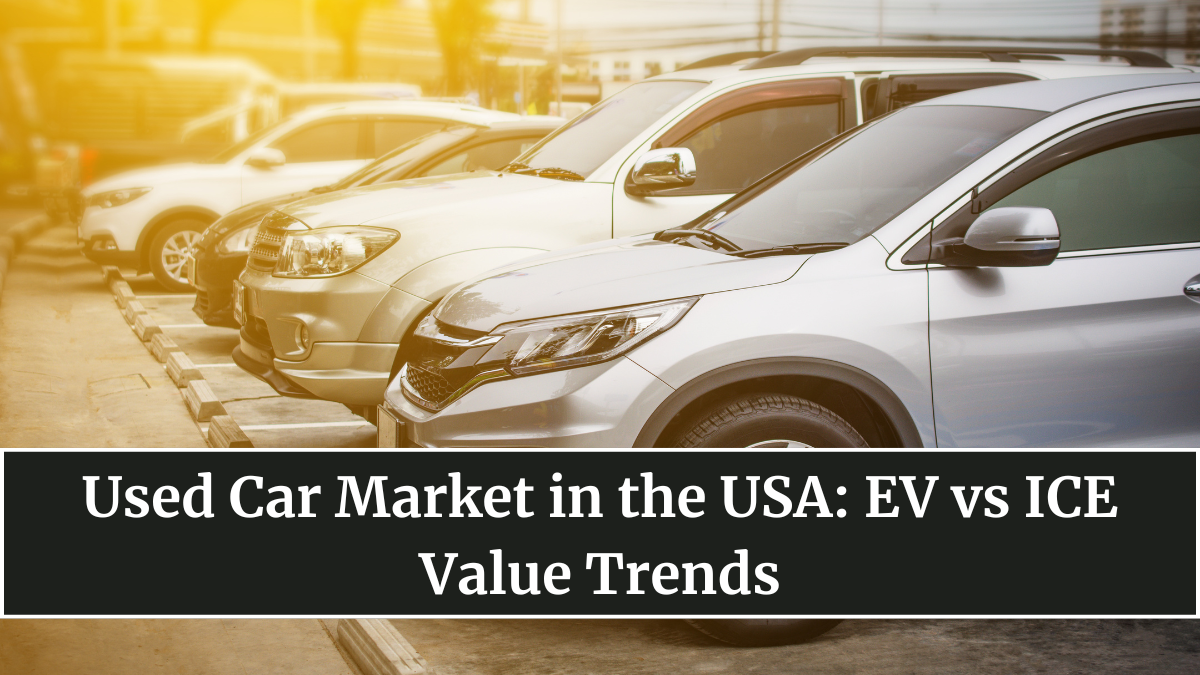The USA vehicle resale market for EV vs ICE cars is undergoing a massive transformation. As electric vehicles become mainstream, the resale value equation — once dominated by internal combustion engine (ICE) cars — is being rewritten. Buyers and sellers alike are asking the same question: Do electric cars hold their value as well as petrol or diesel vehicles? The answer, as 2025 unfolds, is nuanced — and it reveals how consumer confidence, technology, and market maturity are shaping America’s automotive future.

The Current State of the U.S. Used Car Market
The American used-car market is valued at over $1.2 trillion, nearly twice the size of the new car market. But within that, EVs represent only a small yet rapidly growing share.
In 2020, used EV sales made up just 2% of total used car transactions. By 2025, that figure has surged past 8%, driven by more affordable pre-owned Teslas, Nissans, and Chevrolets entering the market. However, the resale performance of EVs compared to ICE vehicles varies depending on factors like battery health, charging infrastructure, and model popularity.
How EVs Compare to ICE Vehicles in Resale Value
Historically, ICE cars have held better resale value due to widespread service networks and consistent demand. However, with new incentives, cheaper charging, and improved battery longevity, EVs are closing the gap quickly.
| Vehicle Type | Average 3-Year Depreciation | Key Factors |
|---|---|---|
| Electric Vehicles (EVs) | 45–50% | Rapid tech evolution, battery degradation perception, incentive impact |
| Internal Combustion Engine (ICE) | 35–40% | Higher fuel costs but strong resale ecosystem |
| Hybrids | 30–35% | Balanced demand and longer range confidence |
Certain EVs — particularly Tesla Model 3, Ford Mustang Mach-E, and Rivian R1T — have shown stronger-than-expected value retention, thanks to high demand and OTA software updates that keep them “digitally fresh.”
Why Some EVs Depreciate Faster
While top-performing models retain value, many budget EVs still face faster depreciation. The key reasons include:
-
Rapid battery innovation: Newer EVs offer longer ranges, making older models feel outdated.
-
Limited used-EV financing: Banks remain cautious about offering loans for pre-owned EVs.
-
High replacement battery costs: Although battery reliability is improving, replacement anxiety impacts resale pricing.
-
Regional demand imbalance: EV demand is strong in states like California and Washington but lower in Midwest and rural markets.
This depreciation gap is expected to narrow significantly as battery warranties extend to 8–10 years and certified used EV programs expand across major automakers.
The Rise of Certified Pre-Owned (CPO) EV Programs
To build trust in the resale market, manufacturers are investing heavily in CPO programs for EVs. Companies like Tesla, Hyundai, BMW, and Nissan now offer certified used EVs with:
-
Full battery and drivetrain inspection.
-
Extended warranty coverage up to 8 years.
-
Verified software updates and maintenance history.
-
Buyback guarantees and transparent range performance.
These initiatives are boosting consumer confidence and increasing resale transaction volumes for electric cars.
How Market Dynamics Are Changing
A few key trends are shaping the EV vs ICE resale equation in 2025:
-
Fuel price volatility: As gasoline prices remain above $3.50 per gallon, EVs become more appealing for long-term savings.
-
Policy push: Several states offer rebates even for used EV purchases, increasing resale demand.
-
Fleet renewals: Companies upgrading delivery or ride-share fleets to newer EVs are feeding a strong supply of used electric vehicles into the market.
-
Digital marketplaces: Platforms like Carvana, AutoTrader, and Shift now include EV battery health metrics in listings, improving buyer transparency.
As a result, used EVs are no longer a risky bet — they’re becoming a smart, sustainable choice for budget-conscious buyers.
The Future: Equilibrium Between EV and ICE
Experts predict that by 2030, EV and ICE resale values will converge, with EVs likely outperforming traditional cars in some states due to better technology retention and lower running costs.
Manufacturers are also designing batteries with longer lifecycles and modular replacement options, which will stabilize second-hand prices. Furthermore, as EV adoption increases, the secondary market for battery recycling and refurbishment will make older vehicles more economical to maintain.
Ultimately, resale value will depend less on powertrain type and more on software updates, connectivity, and sustainability features — areas where EVs have the upper hand.
FAQs
Do electric cars have lower resale value than petrol cars?
Not necessarily. While some budget EVs depreciate faster, models like the Tesla Model 3 and Hyundai Ioniq 5 retain strong value due to technology and demand.
Why do some used EVs lose value quickly?
Rapid battery advancements and limited charging infrastructure in some regions make older EVs less desirable.
Are there certified pre-owned programs for EVs?
Yes. Automakers like Tesla, Nissan, Hyundai, and BMW offer certified used EV programs with extended warranties and verified battery health.
Will EVs hold better value in the future?
Yes. As technology stabilizes, and EV infrastructure grows, electric cars are expected to match or surpass ICE resale values by 2030.
Should I buy a used EV in 2025?
It’s a great option if you choose a model with a verified battery warranty and good range retention — offering savings and sustainability together.
Click here to know more.
